I. What are Adrenal Gland Hormones?
It’s of important notice that the adrenal gland houses many hormones, all of which are important for maintaining the body’s physiological homeostasis. Likewise, we here at MCAT Mastery believe that it would be beneficial to have one specific study article dedicated to the adrenal gland hormones.
The adrenal gland hormones include: 1) cortisol/cortisone, 2) aldosterone, 3) catecholamines (i.e. norepinephrine/epinephrine), and 4) cortical sex hormones. The physiological functions of these hormones are quite varied from increasing blood pressure, reducing inflammation, etc.
Though this study article strictly focused on the hormones of the adrenal glands, it’s equally important to notice how the adrenal hormones connect with other parts of not just the endocrine system, but even other organ systems as well! Always keep in mind these overlaps as this is how the MCAT will test you come test day!
II. Content Review
Let’s start off with some basic anatomy: nothing too crazy, just so that you all can have a reference point for where the hormones are stored and released.
A. Cortisol/Cortisone
These hormones are a type of glucocorticoid and enact a LONG TERM stress response. In addition, these hormones are located and released by the adrenal cortex.
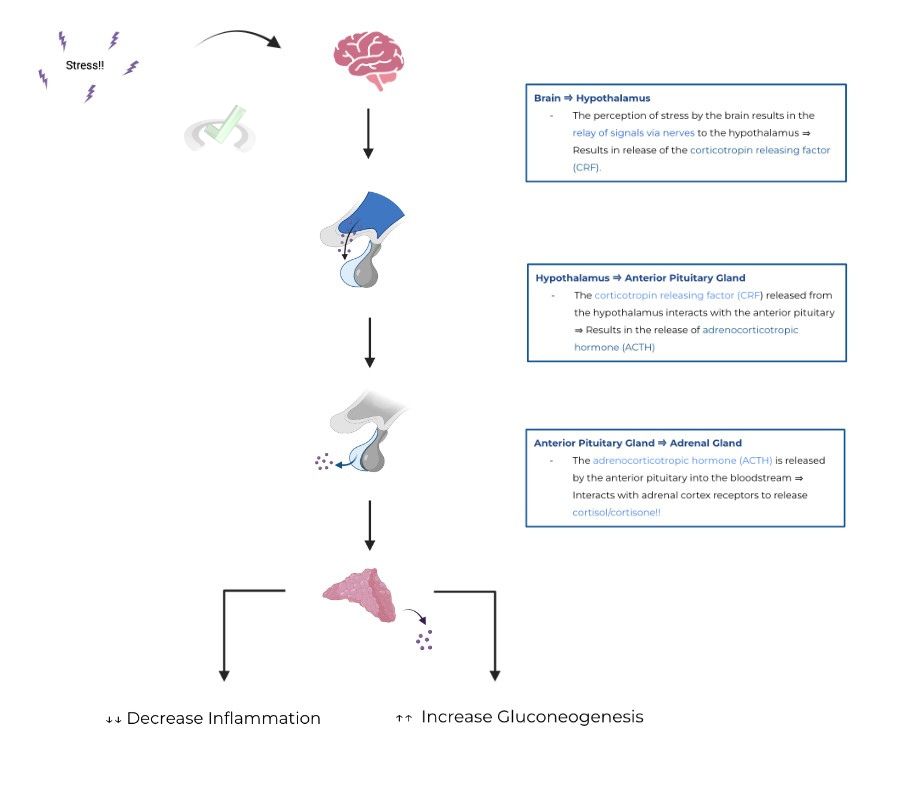
B. Aldosterone
A type of mineralocorticoid also housed in the adrenal cortex, aldosterone’s main stimulator is LOW BLOOD PRESSURE ⇒ As such, aldosterone works to increase blood pressure!
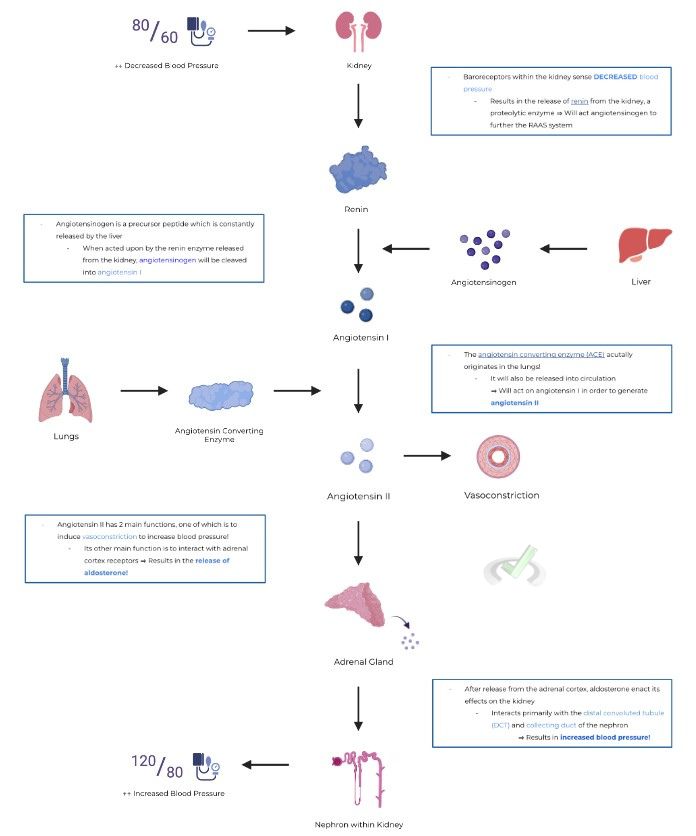
This whole system of interactions is called the Renin-Angiotensin-Aldosterone (RAAS) System, named after the main players of the pathway!
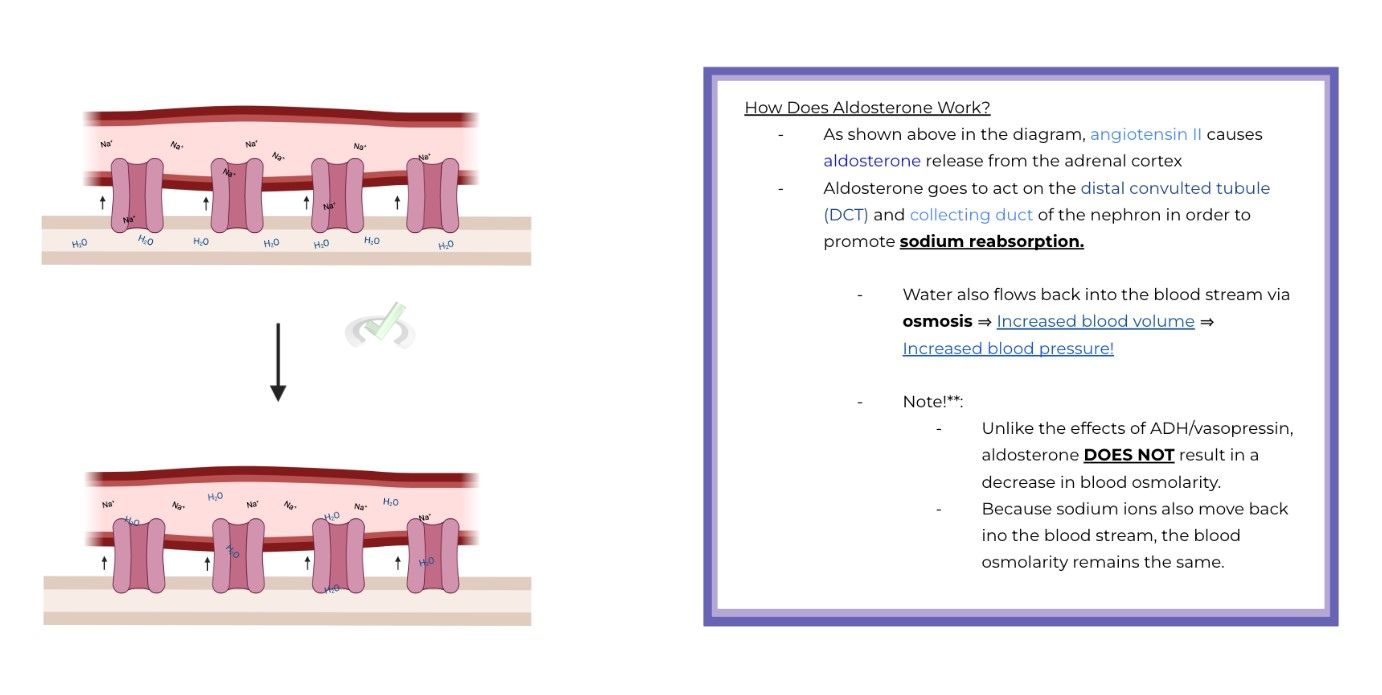
C. Catecholamines (Norepinephrine/Epinephrine)
A type of amino acid derived hormone group which is actually housed in the adrenal medulla (actually only adrenal gland hormones found in the medulla). As opposed to their glucocorticoid counterparts (cortisone/cortisol), they enact a SHORT TERM stress response.
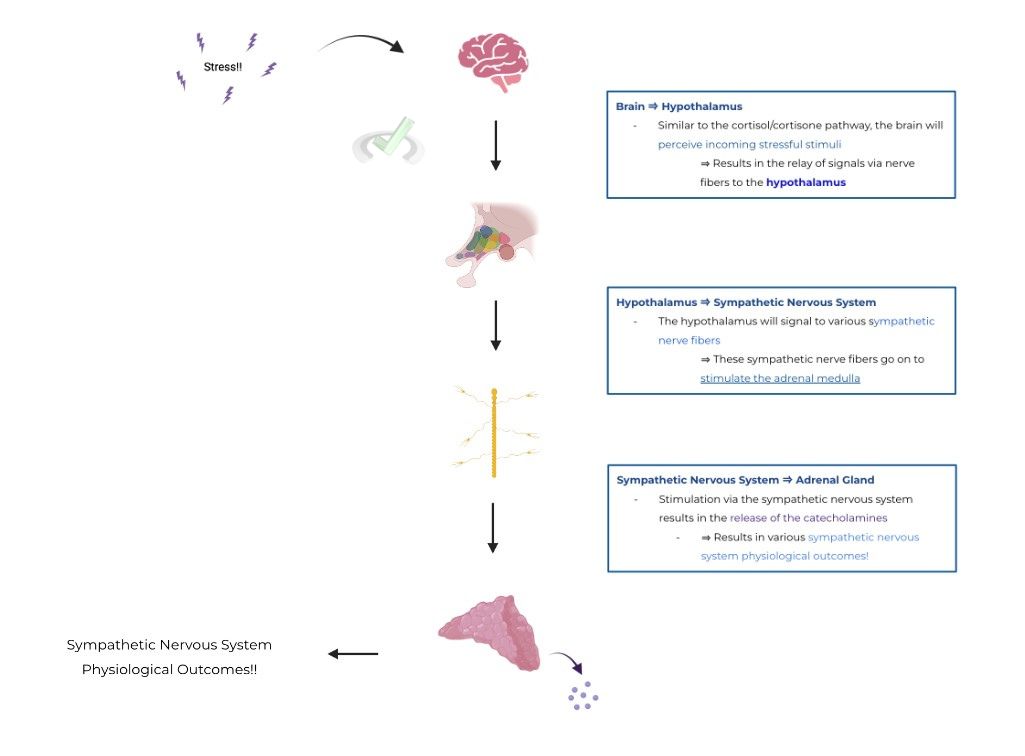
D. Cortical Sex Hormones
As indicated by the name, these hormones are located within the adrenal cortex and include hormones such as androgens and estrogens. Though the adrenal cortex houses these hormones, they are secreted in a much smaller amount when compared to the gonads.
We’ll cover these hormones in much more detail in another study article but just wanted to make a brief introduction to them in this study article!
III. Bridge/Overlap
You’ll often see while studying the endocrine system that there are a lot of tie-ins with the nervous system. The release of catecholamines is one great example of this overlap! As stated above, the release of catecholamines results in various sympathetic nervous system outcomes.
Let’s take a quick look at the sympathetic and parasympathetic nervous systems and their respective physiological outcomes to get a better understanding of the role of catecholamines!
The autonomic nervous system (ANS) is one division of the peripheral nervous system and is responsible for all our “unconscious, automatic” physiological activities such as breathing, our heart beating, digestion, etc.
The ANS can further be divided into the 1) sympathetic nervous system (“fight or flight”) and the 2) parasympathetic nervous system (“rest and digest”). The dominating system at any given time depends on the individual’s current situation.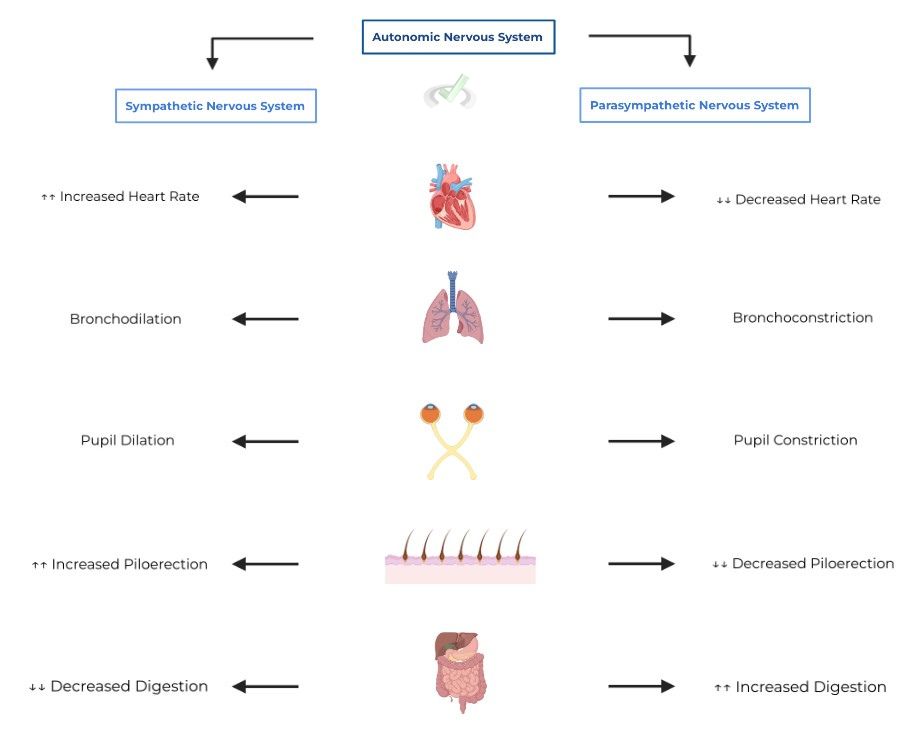
IV. Wrap Up/Key Terms
Let’s take this time to wrap up & concisely summarize what we covered above in the article!
Adrenal Gland Hormones:
The adrenal gland has so many hormones that we felt it was necessary to develop one study article just specific to them! The adrenal gland can be divided into the anatomical divisions:
A. Cortisol/Cortisone
Stress Inducing Stimuli ⇒ Brain ⇒ Hypothalamus ⇒ Anterior Pituitary Gland (ACTH release) ⇒ Adrenal Gland (Cortisol/Cortisone Release) ⇒ ↑↑ Increased Gluconeogenesis and ↓↓ Inflammation
B. Aldosterone
Low Blood Pressure ⇒ Renin Release (from Kidney) ⇒ Cleavage of angiotensinogen to angiotensin I ⇒ Cleavage of angiotensin I to angiotensin II (via ACE enzyme) ⇒ Adrenal Gland (Aldosterone Release)) ⇒ DCT and collecting duct of nephron ⇒ ↑↑ Increased Blood Pressure.
C. Catecholamines (Norepinephrine/Epinephrine)
Stress Inducing Stimuli ⇒ Brain ⇒ Hypothalamus ⇒ Sympathetic Nervous System ⇒ Adrenal Gland (Catecholamine Release)) ⇒ ↑↑ Sympathetic Physiological Outcomes
D. Cortical Sex Hormones:
V. Practice
Take a look at these practice questions to see and solidify your understanding!
Sample Practice Question 1:
Rheumatoid arthritis is a type of autoimmune condition which is usually characterized by increased inflammation of the body’s synovial joints, most commonly the hands. Which of the following hormones would be most beneficial to prescribe for a person suffering from rheumatoid arthritis?
A. Aldosterone
B. Norepinephrine
C. Cortisol
D. Calcitonin
Ans. C
As stated in the question stem, rheumatoid arthritis is an autoimmune condition which results from increased inflammation of the body’s synovial joint. As such, the proper course of action would be to DECREASE inflammation in order to combat the disease.
One of the physiological outcomes of cortisol, a glucocorticoid, release is decreased inflammation ⇒ As such, it would be appropriate to prescribe cortisol in this scenario.
Sample Practice Question 2:
ACE inhibitors such as Lisinopril are a type of medication which inhibit the angiotensin converting enzyme in order to treat a certain disease. Which disease would you expect is the one treated by ACE inhibitors?
A. Hypotension (Low Blood Pressure)
B. Hypertension (High Blood Pressure)
C. Hypoglycemia (Low Serum Glucose)
D. Hyperglycemia (High Serum Glucose)
Ans. B
ACE is a very important enzyme involved in the Renin-Angiotensin-Aldosterone (RAAS) System, which ultimately results in increased blood pressure. By blocking ACE, this pathway would be inhibited and as a result, blood pressure would NOT increase.
As such, ACE inhibitors most likely treat hypertension (high blood pressure) because they are trying to prevent any increase in blood pressure in the individual.

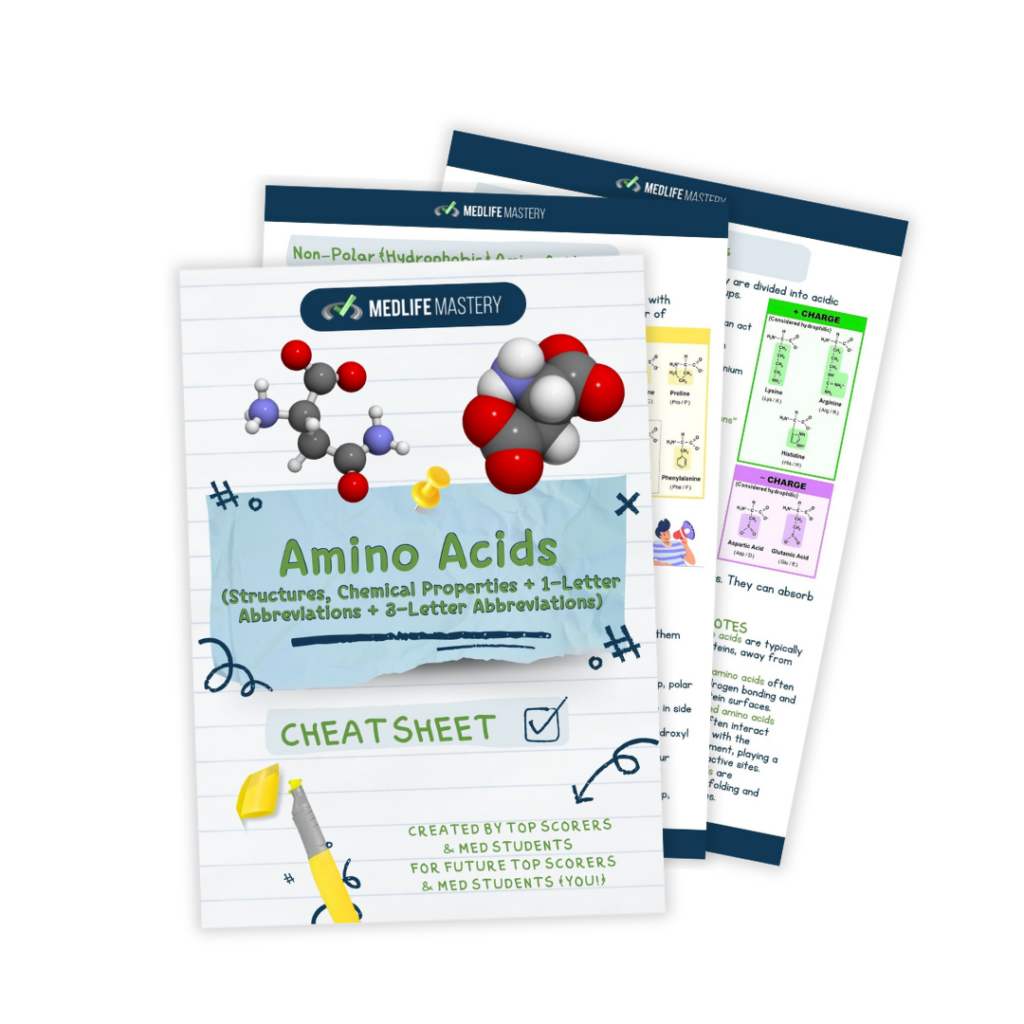

 To help you achieve your goal MCAT score, we take turns hosting these
To help you achieve your goal MCAT score, we take turns hosting these 
























